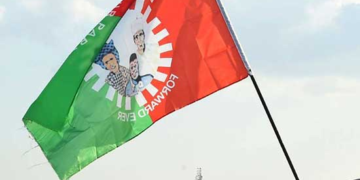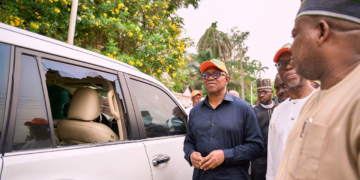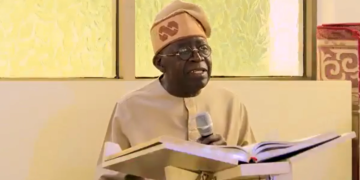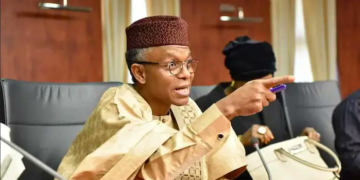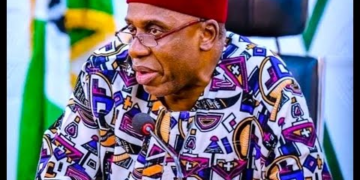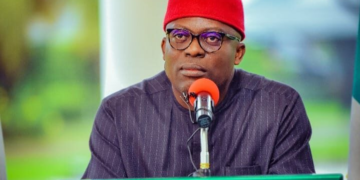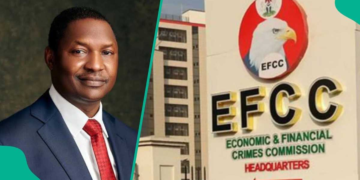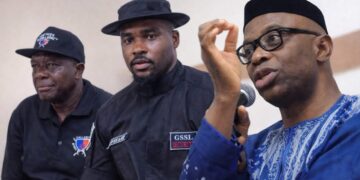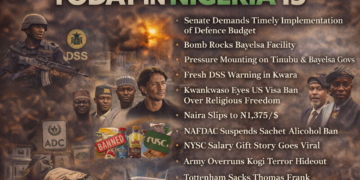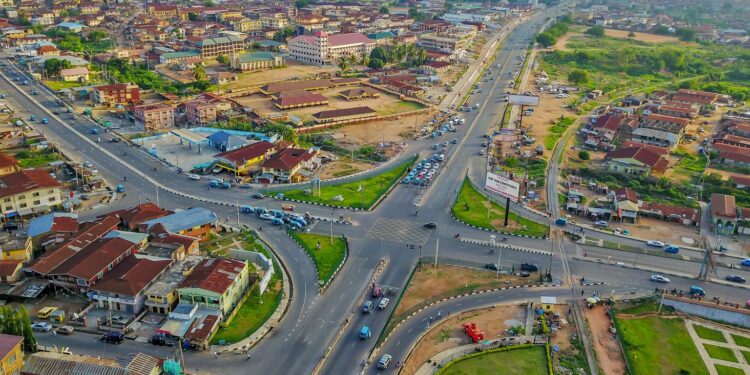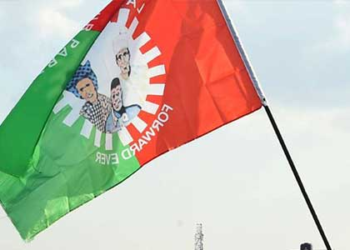Osun State is a state in southwest Nigeria that is sometimes referred to as the State of Osun by the state administration. It is bordered to the east by the states of Ekiti and Ondo, to the north by the state of Kwara, to the south by the state of Ogun, and to the west by the state of Oyo. The state was created on August 27, 1991, from the southeast of Oyo State, and is named after the River Osun, an important river that runs through it. Osogbo serves as the state capital.
With an estimated 4.7 million residents as of 2016, Osun is the ninth-smallest by area and the nineteenth-most populated among Nigeria’s 36 states. Geographically, the state is split between the drier Guinean forest-savanna mosaic in the north and the lowland forests of Nigeria in the majority of the state. The state’s namesake, the River Osun, which bisects the state’s interior before forming a large portion of the state’s southern boundary with Oyo State and flowing south, is one of the significant geographical features. The Erinle and Oba rivers, which are also Osun tributaries and flow from the north before reaching the Osun around the southwest border, are two other significant rivers. Mona monkeys, common kestrels, purple herons, and royal antelope are among the state’s wildlife, as are some of Nigeria’s last surviving Nigeria-Cameroon chimpanzees and African forest elephants, which live in the gravely endangered woods along the state’s southern borders with Ondo and Ogun.
The Yoruba ethnic group, particularly the Ibolo, If, Igbomina, Ijesha, and Oyo subgroups, make up the majority of the population of Osun State.
The region that is now Osun State was divided up into many Western Yoruba states during the pre-colonial era; some of these states were town-based, while others were a part of bigger empires like the Oyo Empire. Western Yoruba states participated in the Kiriji War, which was fought between 1877 and 1893 between Eastern Yoruba groups and Western Yoruba groups. The war was settled through British mediation before the region was colonized and added to the British Southern Nigeria Protectorate, which later merged into British Nigeria in 1914. The territory that is now Osun was a part of the Western Region when the country gained independence in 1960 until the region was divided in 1967, at which point it became a member of the Western State. The Western State was divided in 1976, and the western portion created Oyo State. Oyo State’s eastern portion was severed fifteen years later to become Osun State.
Osun State’s economy is mostly focused on agriculture, particularly the production of cocoa, cassava, millet, maize, potatoes, and yams. Services, particularly in metropolitan areas, artisanal mining, and animal herding are other important businesses. Several of Nigeria’s most well-known sites may be found in Osun, including the campus of Obafemi Awolowo University, one of the country’s top universities. Ile-If, a historic early hub of political and religious development for Yoruba culture, is home to the university. Other major cities and towns include the ancient kingdom-capitals of Ila Orangun, Iragbiji, Ada, Ikirun, Oke-Ila Orangun, Ipetu-Ijesha, Ijebu-Jesa, Erin Oke, Ipetumodu, Ede, Iwo, Ejigbo, Ibokun, Ode-Omu, Otan Ayegbaju, Ifetedo, Esa-Oke, Ilesa, Okuku, Otan-Ile and Igbajo. In addition, Osun State is renowned for having the second-highest literacy rate in the nation.

History
On August 27, 1991, a portion of the previous Oyo State was transformed into the current State of Osun. The name of the state is derived from the River Osun, a revered natural spring that represents the same-named Yoruba deity.
Osun State University, with its six campuses (Osogbo, Okuku, Ikire, Ejigbo, Ifetedo, and Ipetu-Ijesha) strategically placed around the state, was founded by the previous governor Olagunsoye Oyinlola. The Ori Oke and Egungun festival (masquerade festival) in Iragbiji, Olojo in Ife, and the Osun Osogbo festival are notable cultural occasions in the state.
Culture
People from all over the globe come to the yearly Osun-Osogbo festival in August to worship Osun, one of the Orisa (the traditional deities of the Yoruba people). Brazilian, Cuban, Trinidadian, Grenada, and citizens of other American countries with significant Yoruba cultural legacies are among the visitors. Along the banks of the river that bears her name, which, in the tradition of the Yoruba Oratory, the Osun goddess converted into, are conducted annual traditional celebrations and invocations of the goddess.
The Sun-Sogbo Grove, a significant artistic hub and the site of the deity’s yearly ceremonies, was listed as a World Heritage Site in 2005.
Demographics
Ife, Ijesha, Oyo, Ibolo, and Igbomina of the Yoruba people are the main sub-ethnic groups of Sun State, while there are also residents from other regions of Nigeria. There are two official languages: English and Yoruba. The residents of Osun State adhere to Islam, Christianity, and indigenous religions.
Climate
Osun has a tropical savanna climate that is often warm with wet and dry seasons. It gets around 596 inches of rain year and has an average yearly temperature of 64 °F. With an average air moisture of 77% and a UV index of 7, it is dry for 59 days out of the year.

Tourism
Due to its lengthy history and Yoruba cultural foundation, the State of Osun is home to a large number of tourist sites.
This location is regarded as a historical landmark. It is situated along the Osun River and is the residence of Yemoja, the fertility goddess.
Erin-Ijesha is the home of the waterfalls. It is a tourist destination that is close to Oriade. There are seven storeys in the fall.
Mineral Resources in Osun State
The mineral resources of Osun State are listed below.
- Gold
- Granite
- Columbite
- Talc
- Tantalite
- Tourmaline
Osun State, which was formed in August 1991 from the former Oyo State, has a sizable Muslim and Christian population. Among the well-known religious figures from Osun State are Pastor (Dr.) Johnson Ade Odewale of the Christ Apostolic church, Calvary Assembly from Odeomu, who is based in Boston, USA, and Muslim cleric Sheikh Dr. Abu-Abdullah Adelabu of London, who is from the state’s capital city, Osogbo. Pastor E.A Adeboye, who is well-known, is from Ifewara in Osun state. among others, Pastor David Oyedepo. Through the Pilgrims Welfare Boards, in particular, the Osun State government asserts that it provides assistance to both Christians and Muslims in the state.
The two main traditional leaders of Osun State support either Islam or Christianity. While some traditional leaders, such as the Ooni of Ife, Oba Adeyeye Enitan Ogunwusi (Ojaja II), and Owa Obokun Adimula of Ijesaland, Oba Gabriel Adekunle (Aromolaran II), Oba Moses Oyediran Ogunsua Of Modakeke, Oba Samuel Oyebode Oluronke II (Olokuku of Okuku), and Oba Sunday Oba Wahab Kayode Adedeji Oyedotun (Arutu-Oluokun Bibiire I), Ataoja of Osogbo Oba Jimoh Olaonipekun Oyetunji (Larooye II), Timi of Ede Oba Munirudeen Adesola Lawal (Laminisa I), Aragbiji of iragbiji (Oba Abdulrasheed Ayotunde Olabomi),[26] Owa of Otan Ayegbaju Oba Lukman Ojo Fadipe (Olatanka III) and Oluwo of Iwo Oba Abdul Rasheed Adewale Akanbi (Ilufemiloye Telu I) practiced Islam. Although some traditional religion is still practiced, Islam and Christianity are the two major faiths in Osun State.
Education
- Adeleke University, Ede
- Federal Polytechnic, Ede
- Obafemi Awolowo University, Ile-Ife
- Osun State College of Technology, Esa-Oke
- Osun State Polytechnic, Iree
- Osun State University
- Bowen University Iwo
- Westland University Iwo
- Federal College of Education Iwo
- National Open University of Nigeria Iwo Study center
- Wolex Polytechnic Iwo
- Mercy College of Nursing Ìkirè Ile, Iwo
- Iwo City Polytechnic Feesu, Iwo
- Royal College of Public Health Technology Iwo
- Fountain University Osogbo
- Osun State college of Health Technology, Ilesa
- Osun State College of Education, Ilesa
- Federal University of Health Sciences Ila Orangun
- Joseph Ayo Babalola University, Ikeji Arakeji.

Local Government Areas
Osun State is divided into three federal senatorial districts, each of which is composed of two administrative zones. The state consists of thirty Local Government Areas and Area offices, the primary (third-tier) unit of government in Nigeria.
Osun State’s 30 Local Government Area headquarters:
- LGA Headquarters
- Aiyedaade Gbongan
- Aiyedire Ile Ogbo
- Atakunmosa East Iperindo
- Atakunmosa West Osu
- Boluwaduro Otan Ayegbaju
- Boripe Iragbiji
- Ede North Oja Timi
- Ede South Ede
- Egbedore Awo
- Ejigbo Ejigbo
- Ife Central Ile-Ife
- Ife East Oke-Ogbo
- Ife North Ipetumodu
- Ife South Ifetedo
- Ifedayo Oke-Ila Orangun
- Ifelodun Ikirun
- Ila Ila Orangun
- Ilesa East Ilesa
- Ilesa West Ereja Square
- Irepodun Ilobu
- Irewole Ikire
- Isokan Apomu
- Iwo Iwo
- Obokun Ibokun
- Odo Otin Okuku
- Ola Oluwa Bode Osi
- Olorunda Igbonna, Osogbo
- Oriade Ijebu-Jesa
- Orolu Ifon Osun
- Osogbo Osogbo
Notable people
- Enoch Adeboye – General Overseer, Redeemed Christian Church of God
- Chief Dr. Oyin Adejobi- former actor, dramatist and popular poet
- Gbenga Adeboye – musician, comedian and radio presenter
- Toyin Adegbola- actress
- Sheikh Abu-Abdullah Adelabu – scholar and cleric.
- Sen. Ademola Adeleke – Governor
- Isiaka Adeleke – politician and former Governor
- Chief Adebisi Akande- former Governor of Osun State
- General Ipoola Alani Akinrinade (RTD) – former Chief of Army Staff and the First Chief of Defence Staff in Nigeria.
- Akinloye Akinyemi – former Nigerian major
- Bolaji Amusan – Nigerian ICT entrepreneur
- Olusola Amusan – entrepreneur, speaker
- Ogbeni Rauf Aregbesola – former State Governor
- Lanre Buraimoh – artist
- Davido – musician
- Patricia Etteh, Nigerian politician and first female Speaker of the Nigerian House of Representatives
- Daddy Freeze- radio presenter
- Bola Ige SAN-(1930–2001) politician and lawyer
- William Kumuyi – General Overseer, Deeper Life Christian Church
- Duro Ladipo – actor and dramatist
- Gabriel Oladele Olutola – President of the Apostolic church of Nigeria and LAWNA Territorial Chairman.
- Iyiola Omisore – politician and engineer
- Prince Olagunsoye Oyinlola – former Governor of Osun State and former Military Governor of Lagos State

